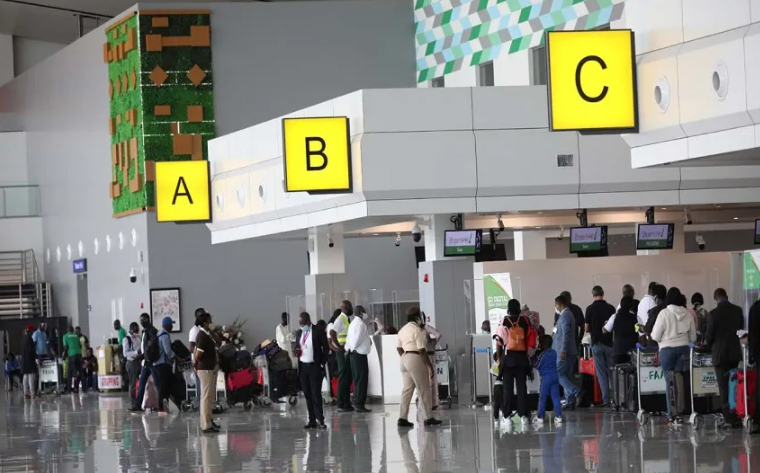Nigerian inbound and outbound passengers are set to face new financial obligations as a fresh $11.5 flight fee is set to take effect from December 1, 2025.
The new $11.5 flight fee, introduced by the Nigeria Civil Aviation Authority (NCAA), is officially an Advance Passenger Information System (APIS) levy.
Pan-Atlantic Kompass reports that the $11.50 APIS charge will apply to every international passenger—both those arriving in and departing from Nigeria.
This fee will be collected at the point of ticket sale, with airlines responsible for remitting the funds to the NCAA.
According to the NCAA, the new levy is a mechanism to enhance national security and border control.
The NCAA also explained that the APIS system, developed in partnership with the Nigeria Immigration Service (NIS), will track passenger movements more effectively.
Streamline passenger clearance at Nigerian airports and provide a cost-recovery framework for the system’s maintenance.
According to the NCAA’s memo to the airlines: “The APIS charge will be collected as a point of sale and will be levied on all tickets issued from December 1, 2025, for each passenger departing from or arriving in Nigeria. The lifting airline is responsible for remitting the APIS charge to the NCAA.
“Therefore, all airlines (including Nigerian carriers) operating international flights into and out of Nigeria are required to take immediate steps to update ticketing and reservation systems to reflect the new APIS charge, as invoicing for the charge will commence from 1st December 2025 for tickets issued to passengers from 01DEC2025 for travel to and from Nigeria.
“Infants, diplomats, airline crew on duty, and transit/transfer passengers within 24 hours are exempted.”
Pan-Atlantic Kompass reports that the new $11.5 flight fee is different from the extant $20 security levy introduced in 2010 by the former Director-General of NCAA, Dr Harold Demuren, in the wake of the Umar Abdulmutallab suicide bomber crisis of December 25, 2009, which was expected to last for 20 years.
With the additional $11.50, the total security-related charges imposed by the NCAA alone will increase to $31.50 per international flight ticket.
When combined with existing charges, such as the $100 Passenger Service Charge (PSC) collected by the Federal Airports Authority of Nigeria (FAAN) and other taxes, the average inbound or outbound Nigerian traveller pays more for a flight ticket.
Many Nigerian travellers are now facing a cumulative total of about $150 in various taxes and levies per flight.
The development came after IATA revealed that Nigerian air travellers pay an average of $180 per foreign departure and arrival, which is about 264 per cent higher than any other African country.
IATA also said that charges and levies in Nigeria were among the world’s most expensive, yet without any significant value to show for it. Data obtained from IATA indicated that at least 90 countries require airlines to submit Advance Passenger Information (API) before a flight’s arrival.
Airlines are responsible for collecting this data from passengers during the check-in process and transmitting it to the border control authorities of the destination country.
Some of the countries are the United States of America (USA), Canada, Mexico, the United Kingdom, France, Germany, Spain, Italy, the Netherlands, Ireland, Switzerland, Austria, South Korea, Taiwan, India, Thailand, Indonesia, Jamaica, Antigua and Barbuda, Barbados, Bermuda, Brazil, and Costa Rica.
However, most of the aforementioned countries, particularly in Europe and the Americas, do not charge passengers or airlines an additional fee for providing this information before departure or arrival.
Meanwhile, many aviation industry experts have reacted to the recent development.
Aviation industry analyst Chris Amokwu stated that the various charges or levies imposed on airlines and the travelling public were harming the country’s air business, while also leading to a hike in airfares both within and outside the country.
Amokwu explained that Nigeria had the privilege and opportunity to rule African aviation but lacked the strategy to do so. He regretted that the government and its agencies still view aviation as elitist, rather than an economic driver, a reason he said the government imposed various levies on air travel, contradicting the International Civil Aviation Organisation’s (ICAO) practices and recommendations against making the sector profit-oriented.
He said: “Do you know that a lot of Nigerians go by road to neighbouring countries in West Africa to join flights to the world? Before now, they went by flight to these countries. Now, economic reality has forced them onto the streets. Visit Agege, Jibowu, and Maza Maza to see the number of vehicles departing for our neighbouring nations. It is a critical issue today and can only worsen with additional charges.
“APIS is a national security programme. Why are we passing it to the passengers? How did we get to the value of $11.5 per passenger? This is more like an App. Why the high cost? Nigeria needs to encourage more people to fly. We have the population.
“Many countries do not charge the APIS fee. Those that do. It is almost negligible. Like five dirhams in the UAE. The UK does not charge. The U.S. does not charge. You can check them out.”
Also, an aviation security expert, Group Captain John Ojikutu (rtd), questioned the essence of the levy. Ojikutu expressed that the NCAA was already charging passengers through airlines the sum of $20 as a security levy, while an additional five percent was also being warehoused by the same NCAA on behalf of the other four agencies.
Ojikutu described the proposed levy as multiple taxation on the travelling public, but said the new charge would only be acceptable to the public if the agency planned to abolish the current $20 fee for the same security purpose.





